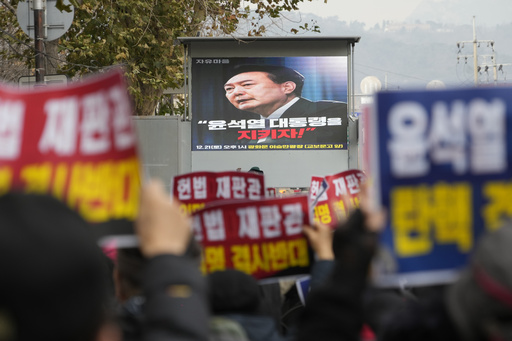
SEOUL, South Korea — South Korean authorities have once again sought to interrogate the impeached President Yoon Suk Yeol regarding his controversial martial law declaration made on December 3. Despite his ongoing refusal to cooperate, investigators have summoned him for questioning on Christmas Day.
The Corruption Investigation Office for High-Ranking Officials, leading a collaborative investigation alongside police and military agencies, is delving into what they perceive as an attempted power grab that lasted merely a few hours. They intend to question Yoon on allegations of abuse of authority and instigation of a rebellion. Following his impeachment on December 14, Yoon has seen his presidential powers suspended and has rebuffed three requests from the investigative team and public prosecutors to appear. He has also obstructed any searches of his office.
The legal avenues available to the investigators remain somewhat limited if Yoon continues to resist their demands. According to South Korean law, sites potentially linked to military information cannot be searched without the approval of the individual in charge, making it improbable that Yoon will permit any voluntary inquiry if summoned against his will. He is currently prioritizing his defense in the Constitutional Court, which will determine whether he should be removed from office or have his powers reinstated.
Yoon’s martial law order and subsequent impeachment have ignited a political firestorm, disrupting governmental functions, hampering high-level diplomatic efforts, and causing ripples in the financial sector, all while the nation struggles with a weakening economy. Prime Minister Han Duck-soo, acting as the temporary leader, along with other officials, have been attempting to reassure both allies and diplomatic counterparts that normalcy is being restored. However, increasing tension persists between rival political factions as they contest various government policies and the filling of three vacant positions on the Constitutional Court.
Progress has been made in detaining key military personnel involved in enforcing the martial law decree, a move reminiscent of the oppressive regimes the country experienced decades ago. Significant arrests have included Yoon’s defense minister, the police chief, and several military leaders. Yoon and his military commanders face allegations of attempting to prevent a parliamentary vote to repeal the martial law by surrounding the National Assembly with armed troops. Nevertheless, lawmakers who accessed the Assembly managed to pass the motion to lift the martial law by a unanimous vote of 190-0. Yoon contends that the troops were merely deployed to maintain public order.
Kwak Jong-keun, the recently detained commander of the Army Special Warfare Command, provided testimony in parliament suggesting that Yoon ordered his troops to “quickly destroy the door and drag out the lawmakers” who were inside during the crucial vote, a command that Kwak reported he did not act upon. Furthermore, Yoon stands accused of instructing defense intelligence officials to detain prominent politicians, including opposition leader Lee Jae-myung, National Assembly speaker Woo Won Shik, and Han Dong-hun, his former party leader.
Investigations led to a court-approved warrant for the arrest of Maj. Gen. Moon Sang-ho, head of the Defense Intelligence Command, who was taken into custody this week under suspicion of sending forces to the National Election Commission following Yoon’s martial law declaration. Yoon justified the troop deployment at the election commission, stating it was pertinent to investigate potential weaknesses in the commission’s computer systems that could compromise election integrity.
However, concerns have been raised regarding Yoon’s failure to substantiate his claims, leading to speculation that he may be endorsing unfounded conspiracy theories surrounding the legitimacy of the April parliamentary elections, in which the Democratic Party emerged victorious by a significant margin. The election commission has categorically denied Yoon’s allegations, confirming no evidence of electoral fraud.
Additionally, Moon, the military intelligence chief, is under scrutiny for purportedly discussing plans for enforcing martial law with colleagues just two days before Yoon’s declaration, raising further questions about the urgency and legality of the actions taken.
On Thursday, Seok Dong-hyeon, a lawyer and spokesperson for Yoon’s legal team, defended the president’s actions, asserting that Yoon did not engage in rebellion but regarded martial law as a necessary response to the opposition Democratic Party’s obstruction of his legislative agenda. Seok maintained that Yoon did not intend to disrupt parliamentary operations despite the troop movements around the Assembly and denied that he ordered the detention of any politicians.
When pressed about Yoon’s ongoing disregard for authorities’ requests for questioning and office searches, Seok was non-committal, stating that these issues would be resolved by Yoon’s legal team, which is reportedly nearing full formation. Experts suggest that any effort to compel Yoon’s appearance for questioning would ultimately hinge on the consent of the country’s acting leader, Prime Minister Han Duck-soo, who remains entangled in a standoff with the opposition after vetoing several contentious agricultural proposals backed by that party.
